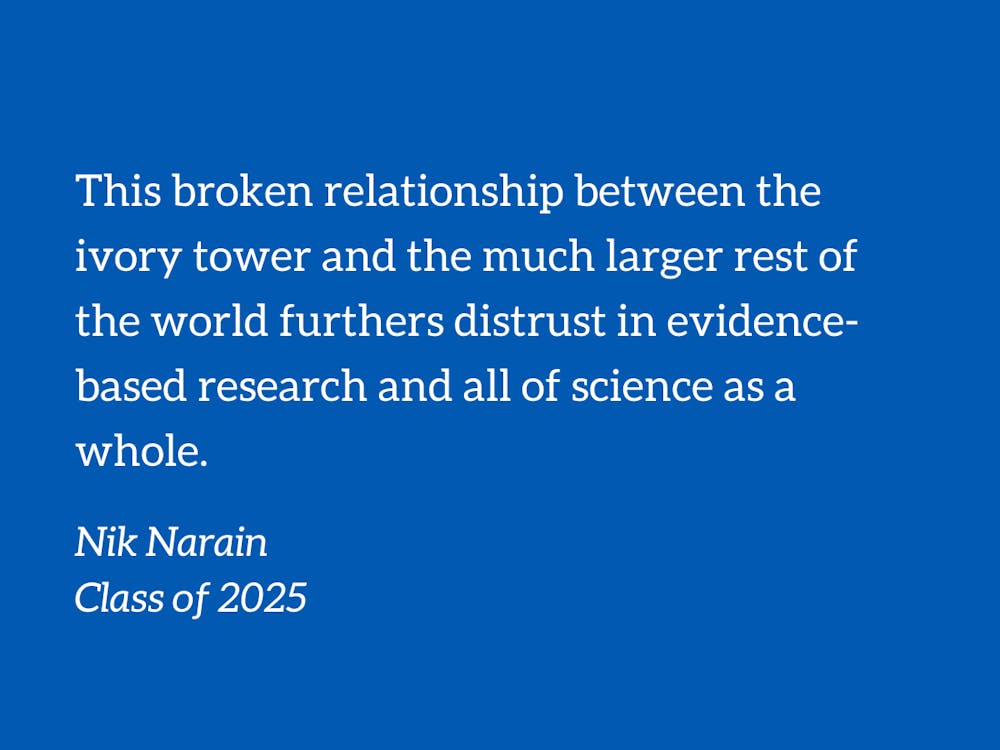A study from this February by the University of Michigan estimated that 15% of Americans don’t believe climate change is real. The researchers analyzed over 7.4 million tweets from roughly 1.3 million people, who geocoded the posts and classified the posts as “for” or “against” climate change using an AI large language model. Climate change denialism was most highly clustered in the central and Southern U.S. and was further correlated with political affiliation.
At an institution with its own Office of Sustainability, Climate Commitment and an entire school dedicated to the study of the environment, I find that the idea of an active portion of the public denying such a seemingly obvious threat to our country feels at the very least farcical. With so much research supporting climate change, how is this issue still so polarized?
The main issue in climate discourse is not the fact that the climate is changing, but the degree to which humans are at the root of this change. After all, the Earth’s average climate has fluctuated wildly over its long history, and humans have historically had little control over these changes. Climate change deniers view natural disasters as a natural occurrence whose increased frequency has no correlation to climate change, but instead has correlation to an increased availability of information about natural disasters. They report that climate statistics are wildly exaggerated and connect this sense of overblown rhetoric with a need for increased scrutiny of such claims. After all, it’s safe to say that methane, for example, is a load of bullsh*t (think about it).
But more so than a distrust in the facts is a distrust in people. A study in Plos Climate reported that U.S. voters who don’t trust universities are also more likely to believe that human activity doesn’t cause climate change. The paper also referenced a 2016 poll in which 57% of conservative Republicans were found to believe that climate research findings were influenced by scientists keen to advance their careers over promoting truth. This broken relationship between the ivory tower and the much larger rest of the world furthers distrust in evidence-based research and all of science as a whole.
The challenge with climate change is that it is not only a scientific finding but a personal responsibility. Climate change is not just a process, but a mindset (kind of like being premed), and with that comes a set of demanding psychological and lifestyle changes some people either don’t want to or can’t commit to. After all, climate anxiety is a very real thing, and the passion and prioritization of climate change has the potential to compromise our well-being to a point of disservice to ourselves and consequently the world around us. Getting more people on board with efforts towards climate justice or even just believing in climate change is extremely important. It is not only critical to the health and safety of our planet and the welfare of communities around the world, but also to our global economies. For example, according to the United Nations, many people don’t know that renewable energies like solar or wind power are actually cheaper than fossil fuels and generate three times as many jobs of comparable wages.
At the end of the day, people are not going to care about issues that don’t impact them directly, and people are not going to trust information from sources that they find exclusionary or suspicious. Combating climate denialism starts with effective climate communication and especially climate storytelling because the majority of people engage with science through media and not academia (after all, that’s why you’re reading an Opinion article in a student newspaper over a journal article in PLOS Climate).
It is clear with an ever-growing body of research that the hard “facts” of climate change are not changing — our global temperatures are rising, natural disasters are growing all the more prevalent, we are accelerating a sixth extinction, and plenty more unsettling truths about the state of our world. If scientists are reaching the same conclusions about the detriments of our consumption, what needs to change is the way we present this information, and how we choose to craft a narrative that leaves its audience hopeful rather than with a deep sense of impending doom. At least, I know that’s the kind of media I need, as I fear that my own deep dives into this subject has left me feeling something worse than fear: apathy. I’m sure many of you reading this can resonate with this.
Several organizations are seeking to tell climate stories in original ways, like the Climate Stories Project, Yale Climate Connections and Grist online magazine. These outlets, among several others that would take pages to list, leverage the power of personal narrative and draw a human connection to the multitude of facts we’ve accumulated over just a few short decades of climate research. For the many students at Duke working towards a career in climate justice, I can only empathize with how challenging it is to focus your energy so deeply on an issue that many people still believe to be a “hoax” — or at least say that on X. If anything, I hope this piece affirms the work you’re already doing, and encourages you to share the stories of that progress.
Nik Narain is a Trinity junior. His column typically runs on alternating Thursdays.
Get The Chronicle straight to your inbox
Sign up for our weekly newsletter. Cancel at any time.

